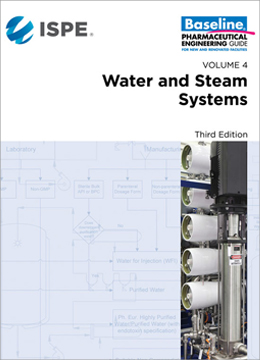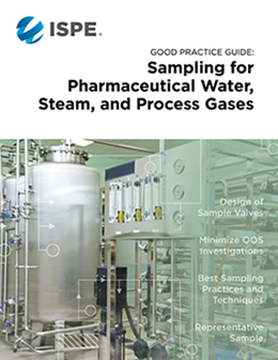Storage Delivery and Qualification of Pharmaceutical Waters (T23) - Updated!
Overview
This training course will explore the essential concepts and principles of specification, design, commissioning/qualification of equipment and systems used to store and distribute water in pharmaceutical manufacturing. The course has been substantially updated to feature the guiding principles of theWater and Steam Systems Baseline® Guide (3rd Edition) with particular emphasis placed upon the new chapters for microbial control, laboratory water and rouging. The course material will cover methods for determining the appropriate distribution and storage strategy, including sanitization method, for various operating circumstances including an overview of optional distribution approaches and the advantages and disadvantages of each. Microbial control characteristics of the various distribution systems will be presented and compared. Point-of-use service and sample point design, materials of construction for distribution and storage systems, and instrument components will also be covered.
The course will include discussion of the upcoming European Pharmacopoeia regulatory change allowing alternative WFI production methods in addition to distillation. The change will align EP requirements closely with USP WFI production methods opening opportunities for membrane-based systems. The course will also include material from the new ISPE Good Practice Guide: Sampling for Pharmaceutical Water, Steam and Process Gases and will review optimizing sampling plans to significantly reduce operational costs.
What You Will Learn
- Traditional and risk-based approaches to pharmaceutical water system commissioning
- Verification and qualification will be explored
- System and component level impact assessments will be covered as well as identifying critical process parameters and critical quality attributes
- The overall validation lifecycle for pharmaceutical water systems
- Operational, and Performance Qualifications
- Sampling programs for qualification and normal operation will be discussed
Resources and Activities
- Pre-Course Work Materials
- Interactive Exercises
- Learning Assessments
- Water and Steam Systems Baseline® Guide (3rd Edition)
- Good Practice Guide: Sampling for Pharmaceutical Water, Steam, and Process Gases
Course Modules
- Regulatory Overview
- Planning & Programming
- Storage & Distribution Sanitization and Microbial Control
- Storage & Distribution Configurations
- Storage and Distribution Design
- Laboratory Water Storage and Distribution
- Commissioning, Qualification & Validation
- System Sampling
- Rouge, Stainless Steel and Passivation
- Appendix: Traditional, Risk and Science-Based Water System Commissioning and Qualification
Who Should Attend
- Professionals new to pharmaceutical water distribution systems.
- Those with significant engineering expertise from another industry who need to learn about pharmaceutical water distribution systems
- Those with significant pharmaceutical industry experience in a non-water system capacity who now have water system engineering and/or maintenance responsibilities and want to gain a fundamental understanding of the requirements for designing, building, operating, testing, and maintaining these systems
- Quality assurance and quality control specialists, manufacturing supervisors, technical support personnel, validation personnel, and all levels of management who want to gain a fundamental understanding of pharmaceutical water systems
- Commissioning and validation engineers with experience in the field but who may be unfamiliar with pharmaceutical water
Additional Course Details:
Additional content from the ISPE Water and Steam Systems Baseline® Guide (3rd Edition) will include the risk assessment and risk mitigation process used during design and qualification is crucial to ensuring product quality, allowing system designers and operators to gain process understanding of those product/process quality attributes which affect water or steam quality. The course will use a risk assessment example to determine the critical aspects, definition of critical quality attributes/critical process parameters (CQA/CPP), and identification/appropriate execution of quality indicating verification activities applied throughout the Validation Life Cycle.
Examples of a science and risk-based risk-management process for water and steam systems and typical system boundaries and critical aspects examples are discussed. Information is provided on the URs, FS, and how a QbD approach including Critical Aspects (CA) – CQAs and CPPs may be implemented. The module provides an alternative “science and risk-based” method that can be applied to the qualification of GMP water and steam systems.
Learning Objectives:
- Differentiate regulatory requirements from regulatory myths relative to water distribution and storage systems
- Identify the alternative designs for storage and distribution systems and the advantages and disadvantages of each
- Analyze the principles behind water system testing and qualification
- Understand the impact of water quality requirements (compendial and non-compendial) on water system operations
- Define the basic requirements for water distribution system component and overall system construction
- Integrate commissioning and validation activities
- Streamline the validation process
- The course will provide and understanding on the importance of C&Q (Verification) and how it fits into the Validation Life Cycle and the Project Lifecycle
- Explain and demonstrate an example of a science and risk based risk management process for water and steam systems and what are typical system boundaries and critical aspects
- Discuss Critical Aspects (CA) – CQAs and CPPs
- Discuss business essential parameters – key business considerations for design, construction, commissioning, and qualification. Some of these relate to non-product quality items like HSE considerations, IT, or other “commissioning only” project scope items.
- Provide identification of and discussion on project scope activities included in the qualification of water and steam systems in the context of full project delivery
- Provide information on the URs, FS, and how a QbD approach may be implemented.
- Ultimately, provide an alternative “science and risk-based” method that can be applied to the qualification of GMP water and steam systems
Note: ISPE has two Pharmaceutical Water training courses that we deliver consecutively at our training events. You might also be interested in the Pharmaceutical Water Generation training course.
Included in the Pharmaceutical Water Systems Certificate Program
Community of Practice (COP)
This training course is of particular interest to existing and future members of the ISPE Critical Utilities Community of Practice (COP).



